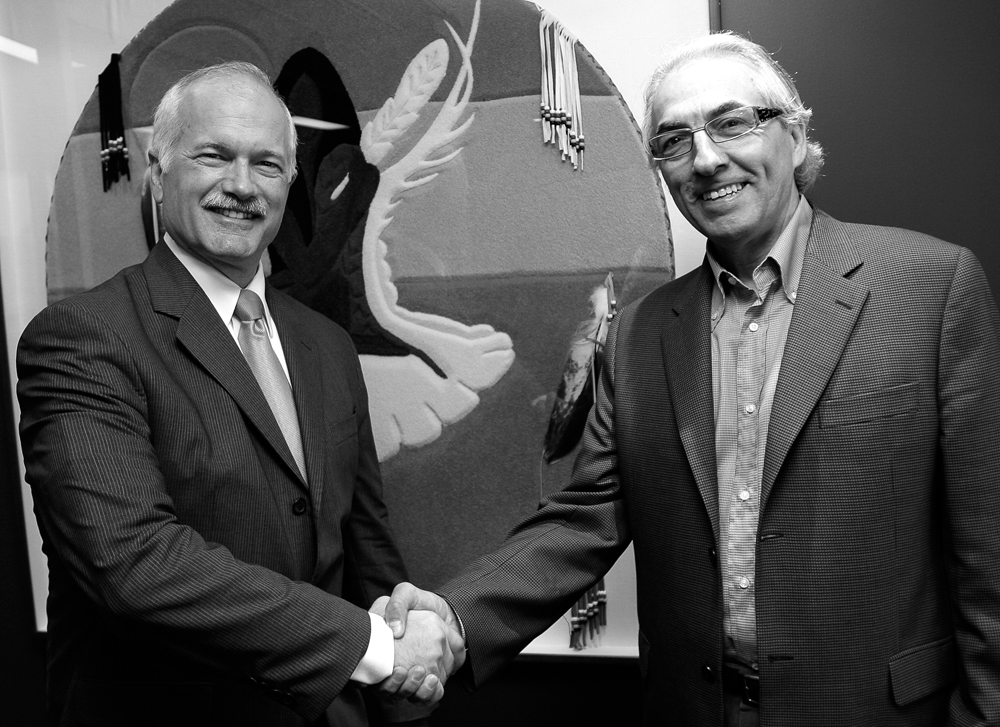
On the eve of National Aboriginal Day, NDP leader Jack Layton gave the aboriginal media the opportunity to chat with him informally on Wawatay Radio Timmins in a format that he described as a “virtual scrum.”
Over the course of an hour, seven journalists had the opportunity to pick Layton’s brain on various issues affecting Aboriginal communities, including Bill C-44, land claims, investment, the Kelowna accord, and the Conservative party’s refusal to adopt the UN Declaration on the Rights of Indigenous Peoples.
Layton started off by speaking of how National Aboriginal Day reminds him of when his own family came to Canada back in 1765 and how they were welcomed by the Mi’kmaq people. Had it not been for the hospitality of Canada’s first people, Layton said, he would not be here today.
“Unfortunately we are not as welcoming anymore in our cities,” he added. “We are not taking responsibility as we are obligated to do for working nation to nation with the First Nations of this land. That is one of our key issues that the national day of protest is going to be raising.”
Layton addressed the Conservative government’s intention to pass Bill C-44. The law would repeal section 67 of the Human Rights Act, which says that the Indian Act is exempt from the Canadian Human Rights Act, depriving Aboriginal peoples the right to sue the government.
In Layton’s opinion, nation-to-nation relationships are what ought to be put into practice. “Most of the witnesses that have appeared suggested that the consultation that needed to happen had not happened,” he noted. “We are maintaining contact with all of the groups that have an interest here and we know that there is some diversity in opinion.”
Naturally the issue of land claims came up on several occasions.
The NDR according to Layton, “has supported the call for an independent body to review and resolve these, more than a hundred-year-old disputes over land rights. It’s fine to have a treaty but if it’s not being implemented, then that treaty is in fact being violated and the word of the crown is not being honoured and that must change.”
Though there have been recent talks in Parliament about a dedicated fund of $250 million a year for 10 years to resolve the land claims issue, Layton is hesitant to trust Harper to carry out the task. “Mr. Harper has not been very good at keeping his promises,” said Layton. “In fact he has violated the signature of the government of Canada on the Atlantic Accord.”
While the Kelowna Accord would have invested billions to improve the lives of Aboriginal people, the Conservatives redirected the funds to different areas, such as the military. Layton sounded his alarm at the amount that Harper has spent on military hardware. He also worries that Harper may be planning on keeping troops in Afghanistan longer than anticipated.
Canada’s current military spending, according to Layton, “has to do with aggressive war fighting, not the peacekeeping role or the national security role or the natural disaster relief role or the sovereignty role which we should be putting as a priority.”
Canada has also been under international scrutiny lately for refusing to adopt the UN Declaration on the Rights of Indigenous Peoples.
Layton detailed how, over the years, government after government in Canada has been “irresponsible and disrespectful to the point where, in many communities, the quality of life, the essentials of life, are not available and the community’s situation is deteriorating. I’ve been to communities where there are four families with 22 children who live in one house that shouldn’t really have more than one family and which is in a terrible state of repair.”
In response to the government’s failure to provide adequate living essentials for some communities, Layton laid out his support to the National Chief’s call for action. “I’ve already mentioned that we wanted nation-to-nation relations, we want a thorough and independent review of all the existing funding mechanisms that would take into account a basic agenda of ending First Nations’ poverty.” Layton then went on to describe a four-coloured bracelet that he now wears around his wrist daily that represents the four corners of the globe, the bracelet says, “Make Poverty History for First Nations.”
Layton beamed with pride as he spoke of how happy he is to be part of that campaign. “We want to see poverty ended in First Nations communities so that people can have an equal opportunity to build thriving lives, thriving communities and thriving economies as well.”
Layton also expressed his frustration in his attempts to get an immediate, complete and unconditional apology on behalf of the Government of Canada for the residential school system tragedy.
Looking towards the future, the NDP would like to see Aboriginal history acknowledged and celebrated on a more national level. The party has proposed that the month of June become National Aboriginal History Month. Some action has been taken at this point in time and the motion is before the House. “It would be celebrated in schools with educational programming, with arts and culture flourishing with history, with special programs of different kinds so that we can be much more aware the history of the Aboriginal communities of this land.”
Layton has encouraged all of his party members across Canada to take to the streets and support Canada’s Aboriginal people on June 29 as he feels that sometimes it is necessary to push governments and “push hard,” to get what’s right done.
“I do hope that the protests are peaceful because no doubt the frustration levels will be very, very high, but you can be sure that the government and the media would look for any opportunity to forget about all of the peaceful ones that are happening and focus on the one that caused a controversy or an injury or an arrest, that is where their instincts take them.”

